Environmental Ethics and Strategy: Google in China Case Study
VerifiedAdded on 2023/05/31
|6
|1648
|213
Case Study
AI Summary
This case study analyzes the ethical and strategic challenges faced by Google in China, focusing on the conflict between corporate ethics and governmental censorship. The analysis employs deontological, utilitarian, and teleological ethical frameworks to evaluate the decisions made by Google and the Chinese government. It examines the impact of censorship on various stakeholders, including Google, its competitors, and the Chinese public. The study recommends that Google negotiate with the Chinese government to find mutually agreeable terms regarding content censorship, rather than shifting services to Hong Kong. Furthermore, the study suggests that both parties should collaborate to create policies that protect public rights while maintaining moral values. The implications of these recommendations include resolving conflicts, safeguarding public rights, and fostering sustainable business relationships. Desklib provides students access to similar case studies and resources for academic support.
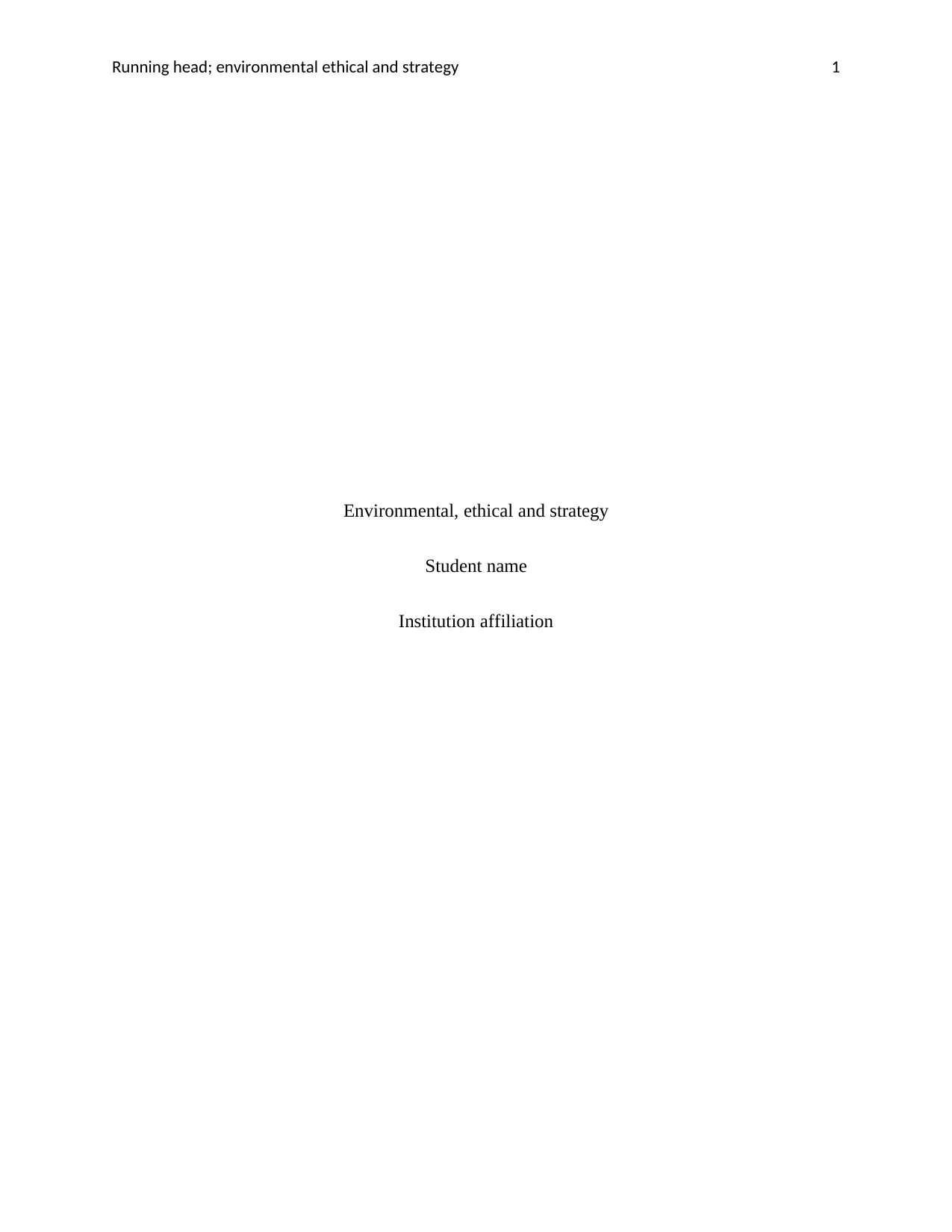
Running head; environmental ethical and strategy 1
Environmental, ethical and strategy
Student name
Institution affiliation
Environmental, ethical and strategy
Student name
Institution affiliation
Paraphrase This Document
Need a fresh take? Get an instant paraphrase of this document with our AI Paraphraser
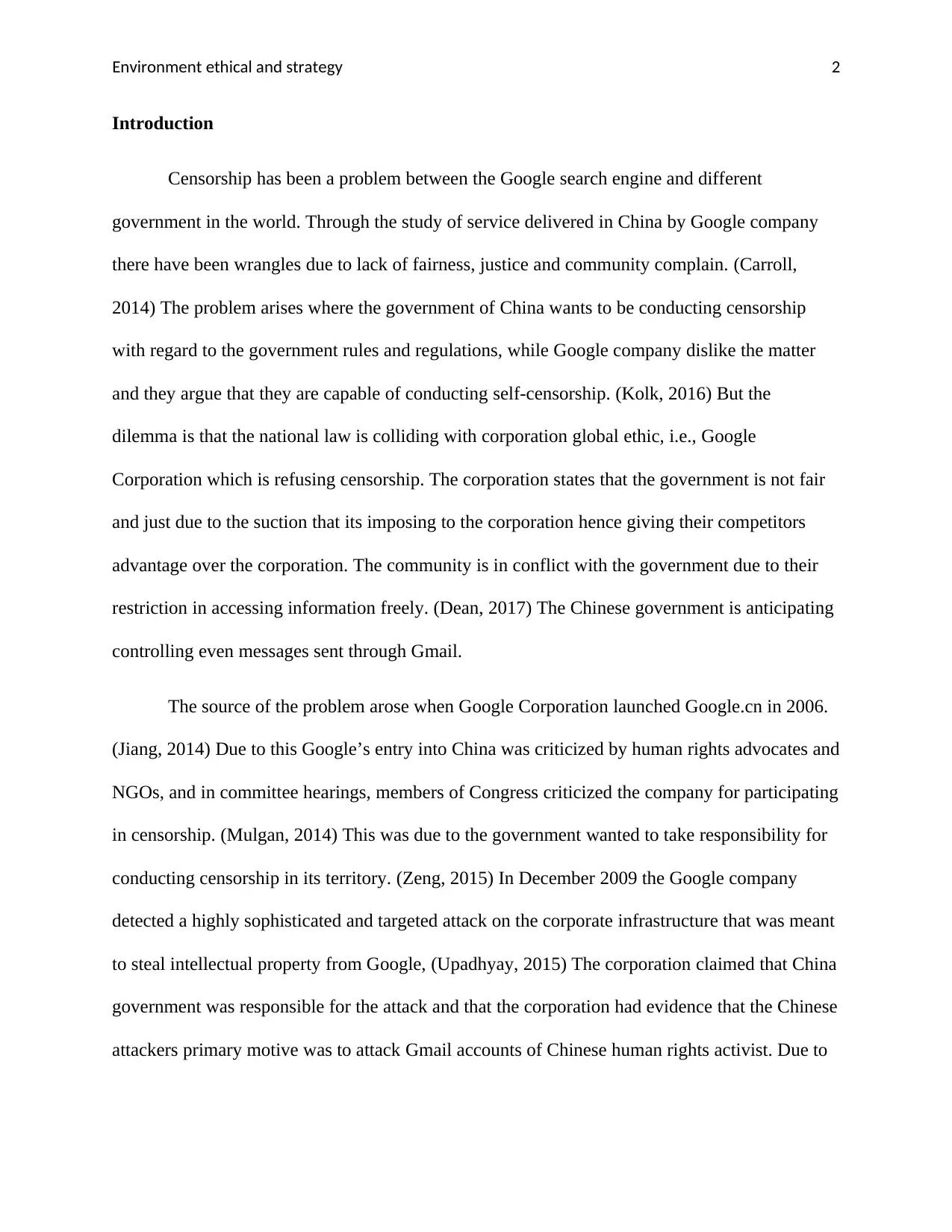
Environment ethical and strategy 2
Introduction
Censorship has been a problem between the Google search engine and different
government in the world. Through the study of service delivered in China by Google company
there have been wrangles due to lack of fairness, justice and community complain. (Carroll,
2014) The problem arises where the government of China wants to be conducting censorship
with regard to the government rules and regulations, while Google company dislike the matter
and they argue that they are capable of conducting self-censorship. (Kolk, 2016) But the
dilemma is that the national law is colliding with corporation global ethic, i.e., Google
Corporation which is refusing censorship. The corporation states that the government is not fair
and just due to the suction that its imposing to the corporation hence giving their competitors
advantage over the corporation. The community is in conflict with the government due to their
restriction in accessing information freely. (Dean, 2017) The Chinese government is anticipating
controlling even messages sent through Gmail.
The source of the problem arose when Google Corporation launched Google.cn in 2006.
(Jiang, 2014) Due to this Google’s entry into China was criticized by human rights advocates and
NGOs, and in committee hearings, members of Congress criticized the company for participating
in censorship. (Mulgan, 2014) This was due to the government wanted to take responsibility for
conducting censorship in its territory. (Zeng, 2015) In December 2009 the Google company
detected a highly sophisticated and targeted attack on the corporate infrastructure that was meant
to steal intellectual property from Google, (Upadhyay, 2015) The corporation claimed that China
government was responsible for the attack and that the corporation had evidence that the Chinese
attackers primary motive was to attack Gmail accounts of Chinese human rights activist. Due to
Introduction
Censorship has been a problem between the Google search engine and different
government in the world. Through the study of service delivered in China by Google company
there have been wrangles due to lack of fairness, justice and community complain. (Carroll,
2014) The problem arises where the government of China wants to be conducting censorship
with regard to the government rules and regulations, while Google company dislike the matter
and they argue that they are capable of conducting self-censorship. (Kolk, 2016) But the
dilemma is that the national law is colliding with corporation global ethic, i.e., Google
Corporation which is refusing censorship. The corporation states that the government is not fair
and just due to the suction that its imposing to the corporation hence giving their competitors
advantage over the corporation. The community is in conflict with the government due to their
restriction in accessing information freely. (Dean, 2017) The Chinese government is anticipating
controlling even messages sent through Gmail.
The source of the problem arose when Google Corporation launched Google.cn in 2006.
(Jiang, 2014) Due to this Google’s entry into China was criticized by human rights advocates and
NGOs, and in committee hearings, members of Congress criticized the company for participating
in censorship. (Mulgan, 2014) This was due to the government wanted to take responsibility for
conducting censorship in its territory. (Zeng, 2015) In December 2009 the Google company
detected a highly sophisticated and targeted attack on the corporate infrastructure that was meant
to steal intellectual property from Google, (Upadhyay, 2015) The corporation claimed that China
government was responsible for the attack and that the corporation had evidence that the Chinese
attackers primary motive was to attack Gmail accounts of Chinese human rights activist. Due to
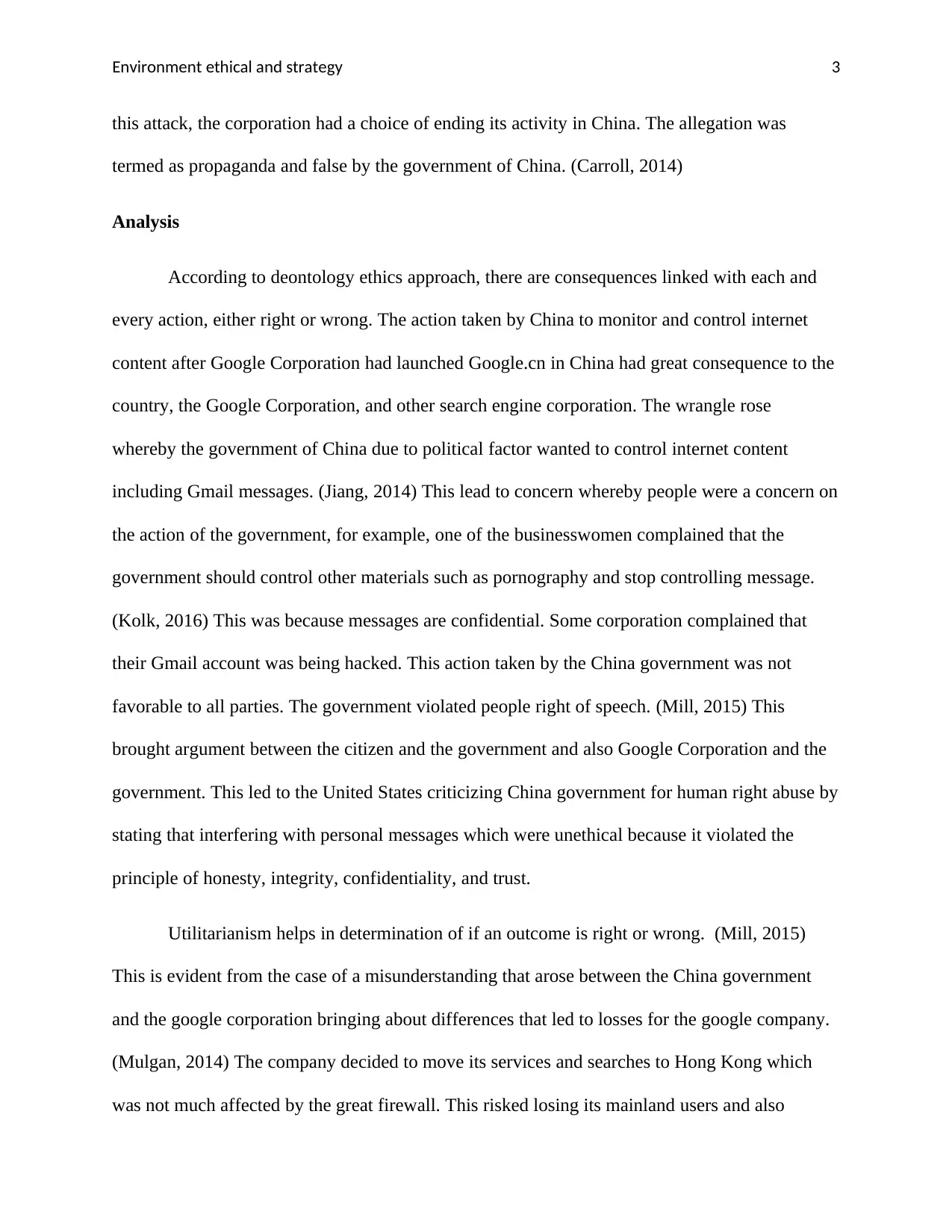
Environment ethical and strategy 3
this attack, the corporation had a choice of ending its activity in China. The allegation was
termed as propaganda and false by the government of China. (Carroll, 2014)
Analysis
According to deontology ethics approach, there are consequences linked with each and
every action, either right or wrong. The action taken by China to monitor and control internet
content after Google Corporation had launched Google.cn in China had great consequence to the
country, the Google Corporation, and other search engine corporation. The wrangle rose
whereby the government of China due to political factor wanted to control internet content
including Gmail messages. (Jiang, 2014) This lead to concern whereby people were a concern on
the action of the government, for example, one of the businesswomen complained that the
government should control other materials such as pornography and stop controlling message.
(Kolk, 2016) This was because messages are confidential. Some corporation complained that
their Gmail account was being hacked. This action taken by the China government was not
favorable to all parties. The government violated people right of speech. (Mill, 2015) This
brought argument between the citizen and the government and also Google Corporation and the
government. This led to the United States criticizing China government for human right abuse by
stating that interfering with personal messages which were unethical because it violated the
principle of honesty, integrity, confidentiality, and trust.
Utilitarianism helps in determination of if an outcome is right or wrong. (Mill, 2015)
This is evident from the case of a misunderstanding that arose between the China government
and the google corporation bringing about differences that led to losses for the google company.
(Mulgan, 2014) The company decided to move its services and searches to Hong Kong which
was not much affected by the great firewall. This risked losing its mainland users and also
this attack, the corporation had a choice of ending its activity in China. The allegation was
termed as propaganda and false by the government of China. (Carroll, 2014)
Analysis
According to deontology ethics approach, there are consequences linked with each and
every action, either right or wrong. The action taken by China to monitor and control internet
content after Google Corporation had launched Google.cn in China had great consequence to the
country, the Google Corporation, and other search engine corporation. The wrangle rose
whereby the government of China due to political factor wanted to control internet content
including Gmail messages. (Jiang, 2014) This lead to concern whereby people were a concern on
the action of the government, for example, one of the businesswomen complained that the
government should control other materials such as pornography and stop controlling message.
(Kolk, 2016) This was because messages are confidential. Some corporation complained that
their Gmail account was being hacked. This action taken by the China government was not
favorable to all parties. The government violated people right of speech. (Mill, 2015) This
brought argument between the citizen and the government and also Google Corporation and the
government. This led to the United States criticizing China government for human right abuse by
stating that interfering with personal messages which were unethical because it violated the
principle of honesty, integrity, confidentiality, and trust.
Utilitarianism helps in determination of if an outcome is right or wrong. (Mill, 2015)
This is evident from the case of a misunderstanding that arose between the China government
and the google corporation bringing about differences that led to losses for the google company.
(Mulgan, 2014) The company decided to move its services and searches to Hong Kong which
was not much affected by the great firewall. This risked losing its mainland users and also
⊘ This is a preview!⊘
Do you want full access?
Subscribe today to unlock all pages.

Trusted by 1+ million students worldwide
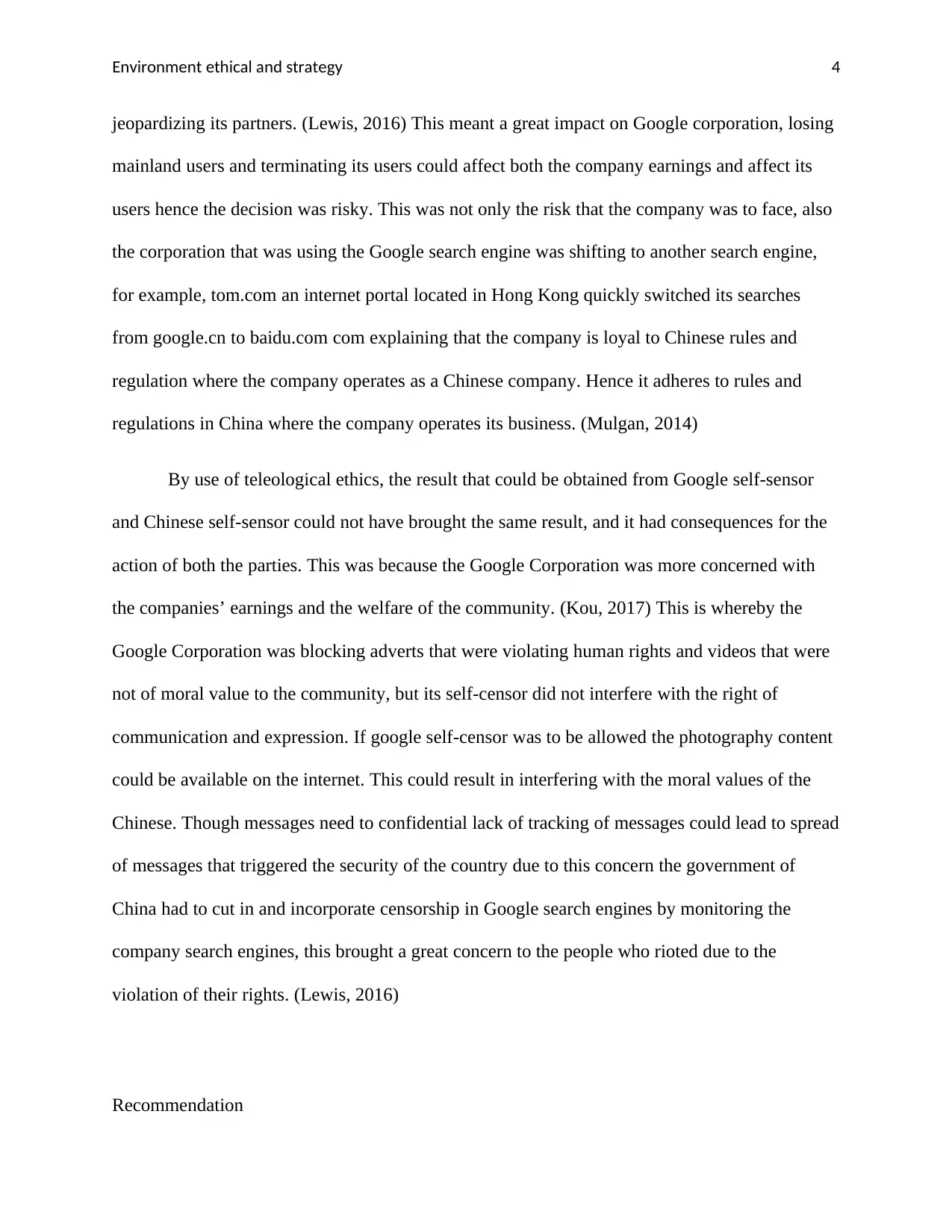
Environment ethical and strategy 4
jeopardizing its partners. (Lewis, 2016) This meant a great impact on Google corporation, losing
mainland users and terminating its users could affect both the company earnings and affect its
users hence the decision was risky. This was not only the risk that the company was to face, also
the corporation that was using the Google search engine was shifting to another search engine,
for example, tom.com an internet portal located in Hong Kong quickly switched its searches
from google.cn to baidu.com com explaining that the company is loyal to Chinese rules and
regulation where the company operates as a Chinese company. Hence it adheres to rules and
regulations in China where the company operates its business. (Mulgan, 2014)
By use of teleological ethics, the result that could be obtained from Google self-sensor
and Chinese self-sensor could not have brought the same result, and it had consequences for the
action of both the parties. This was because the Google Corporation was more concerned with
the companies’ earnings and the welfare of the community. (Kou, 2017) This is whereby the
Google Corporation was blocking adverts that were violating human rights and videos that were
not of moral value to the community, but its self-censor did not interfere with the right of
communication and expression. If google self-censor was to be allowed the photography content
could be available on the internet. This could result in interfering with the moral values of the
Chinese. Though messages need to confidential lack of tracking of messages could lead to spread
of messages that triggered the security of the country due to this concern the government of
China had to cut in and incorporate censorship in Google search engines by monitoring the
company search engines, this brought a great concern to the people who rioted due to the
violation of their rights. (Lewis, 2016)
Recommendation
jeopardizing its partners. (Lewis, 2016) This meant a great impact on Google corporation, losing
mainland users and terminating its users could affect both the company earnings and affect its
users hence the decision was risky. This was not only the risk that the company was to face, also
the corporation that was using the Google search engine was shifting to another search engine,
for example, tom.com an internet portal located in Hong Kong quickly switched its searches
from google.cn to baidu.com com explaining that the company is loyal to Chinese rules and
regulation where the company operates as a Chinese company. Hence it adheres to rules and
regulations in China where the company operates its business. (Mulgan, 2014)
By use of teleological ethics, the result that could be obtained from Google self-sensor
and Chinese self-sensor could not have brought the same result, and it had consequences for the
action of both the parties. This was because the Google Corporation was more concerned with
the companies’ earnings and the welfare of the community. (Kou, 2017) This is whereby the
Google Corporation was blocking adverts that were violating human rights and videos that were
not of moral value to the community, but its self-censor did not interfere with the right of
communication and expression. If google self-censor was to be allowed the photography content
could be available on the internet. This could result in interfering with the moral values of the
Chinese. Though messages need to confidential lack of tracking of messages could lead to spread
of messages that triggered the security of the country due to this concern the government of
China had to cut in and incorporate censorship in Google search engines by monitoring the
company search engines, this brought a great concern to the people who rioted due to the
violation of their rights. (Lewis, 2016)
Recommendation
Paraphrase This Document
Need a fresh take? Get an instant paraphrase of this document with our AI Paraphraser
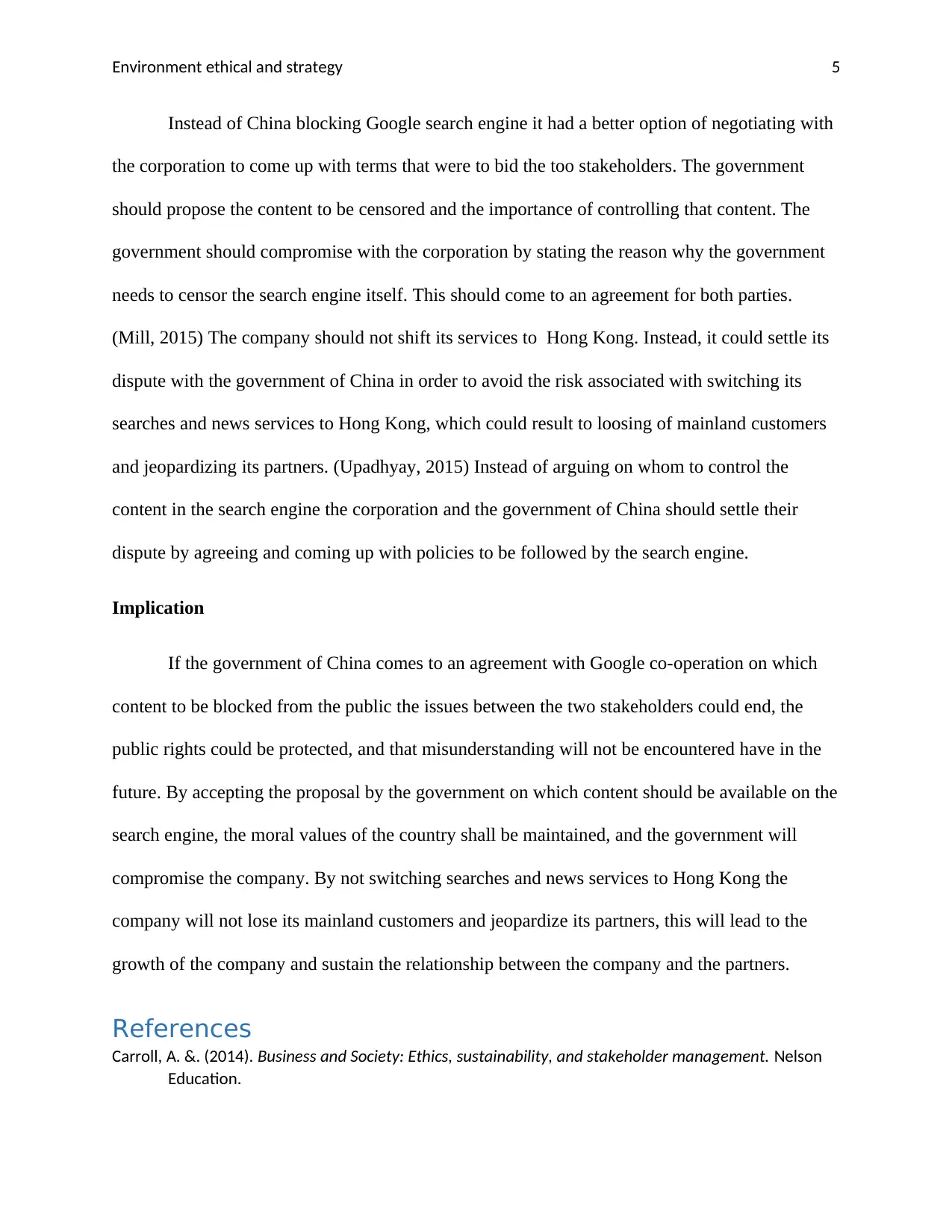
Environment ethical and strategy 5
Instead of China blocking Google search engine it had a better option of negotiating with
the corporation to come up with terms that were to bid the too stakeholders. The government
should propose the content to be censored and the importance of controlling that content. The
government should compromise with the corporation by stating the reason why the government
needs to censor the search engine itself. This should come to an agreement for both parties.
(Mill, 2015) The company should not shift its services to Hong Kong. Instead, it could settle its
dispute with the government of China in order to avoid the risk associated with switching its
searches and news services to Hong Kong, which could result to loosing of mainland customers
and jeopardizing its partners. (Upadhyay, 2015) Instead of arguing on whom to control the
content in the search engine the corporation and the government of China should settle their
dispute by agreeing and coming up with policies to be followed by the search engine.
Implication
If the government of China comes to an agreement with Google co-operation on which
content to be blocked from the public the issues between the two stakeholders could end, the
public rights could be protected, and that misunderstanding will not be encountered have in the
future. By accepting the proposal by the government on which content should be available on the
search engine, the moral values of the country shall be maintained, and the government will
compromise the company. By not switching searches and news services to Hong Kong the
company will not lose its mainland customers and jeopardize its partners, this will lead to the
growth of the company and sustain the relationship between the company and the partners.
References
Carroll, A. &. (2014). Business and Society: Ethics, sustainability, and stakeholder management. Nelson
Education.
Instead of China blocking Google search engine it had a better option of negotiating with
the corporation to come up with terms that were to bid the too stakeholders. The government
should propose the content to be censored and the importance of controlling that content. The
government should compromise with the corporation by stating the reason why the government
needs to censor the search engine itself. This should come to an agreement for both parties.
(Mill, 2015) The company should not shift its services to Hong Kong. Instead, it could settle its
dispute with the government of China in order to avoid the risk associated with switching its
searches and news services to Hong Kong, which could result to loosing of mainland customers
and jeopardizing its partners. (Upadhyay, 2015) Instead of arguing on whom to control the
content in the search engine the corporation and the government of China should settle their
dispute by agreeing and coming up with policies to be followed by the search engine.
Implication
If the government of China comes to an agreement with Google co-operation on which
content to be blocked from the public the issues between the two stakeholders could end, the
public rights could be protected, and that misunderstanding will not be encountered have in the
future. By accepting the proposal by the government on which content should be available on the
search engine, the moral values of the country shall be maintained, and the government will
compromise the company. By not switching searches and news services to Hong Kong the
company will not lose its mainland customers and jeopardize its partners, this will lead to the
growth of the company and sustain the relationship between the company and the partners.
References
Carroll, A. &. (2014). Business and Society: Ethics, sustainability, and stakeholder management. Nelson
Education.
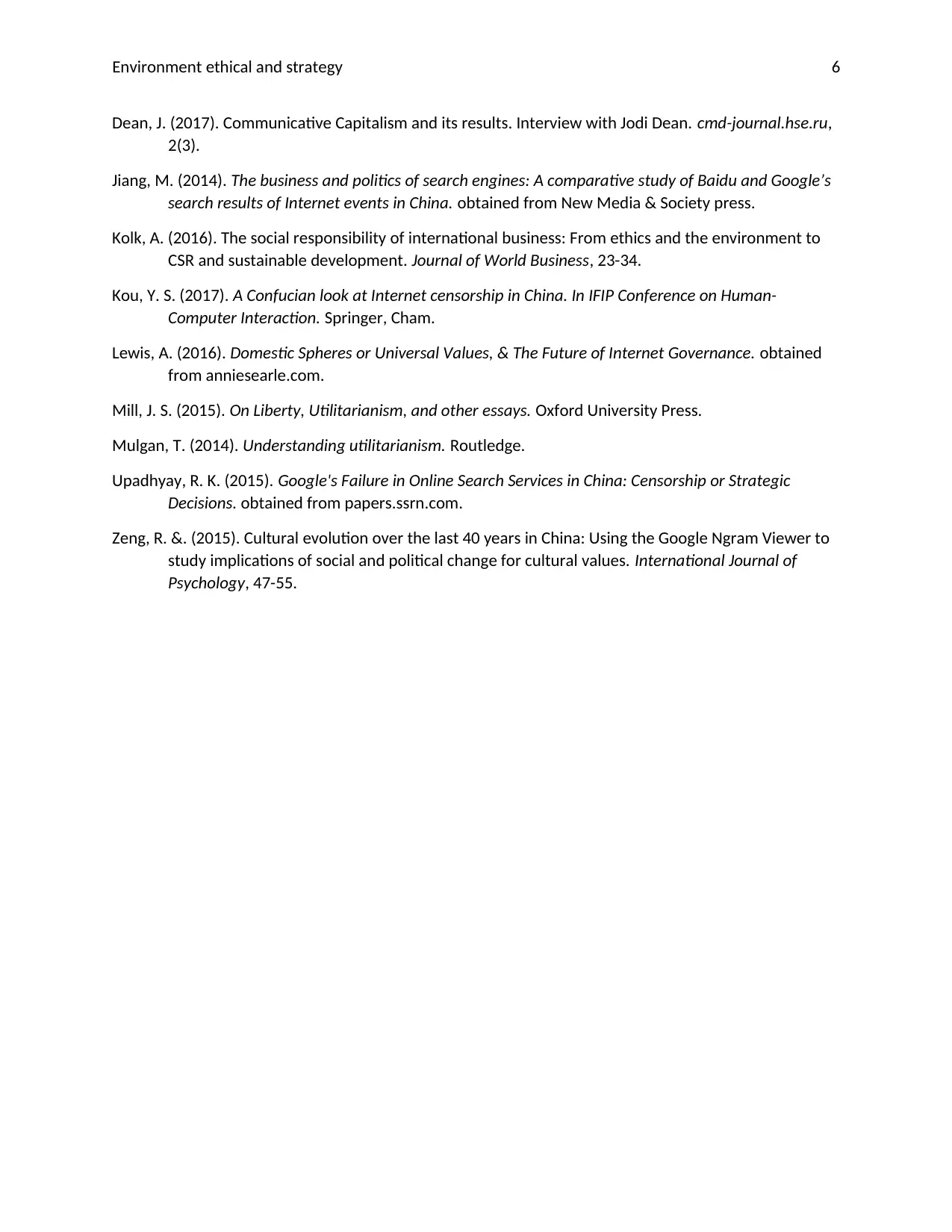
Environment ethical and strategy 6
Dean, J. (2017). Communicative Capitalism and its results. Interview with Jodi Dean. cmd-journal.hse.ru,
2(3).
Jiang, M. (2014). The business and politics of search engines: A comparative study of Baidu and Google’s
search results of Internet events in China. obtained from New Media & Society press.
Kolk, A. (2016). The social responsibility of international business: From ethics and the environment to
CSR and sustainable development. Journal of World Business, 23-34.
Kou, Y. S. (2017). A Confucian look at Internet censorship in China. In IFIP Conference on Human-
Computer Interaction. Springer, Cham.
Lewis, A. (2016). Domestic Spheres or Universal Values, & The Future of Internet Governance. obtained
from anniesearle.com.
Mill, J. S. (2015). On Liberty, Utilitarianism, and other essays. Oxford University Press.
Mulgan, T. (2014). Understanding utilitarianism. Routledge.
Upadhyay, R. K. (2015). Google's Failure in Online Search Services in China: Censorship or Strategic
Decisions. obtained from papers.ssrn.com.
Zeng, R. &. (2015). Cultural evolution over the last 40 years in China: Using the Google Ngram Viewer to
study implications of social and political change for cultural values. International Journal of
Psychology, 47-55.
Dean, J. (2017). Communicative Capitalism and its results. Interview with Jodi Dean. cmd-journal.hse.ru,
2(3).
Jiang, M. (2014). The business and politics of search engines: A comparative study of Baidu and Google’s
search results of Internet events in China. obtained from New Media & Society press.
Kolk, A. (2016). The social responsibility of international business: From ethics and the environment to
CSR and sustainable development. Journal of World Business, 23-34.
Kou, Y. S. (2017). A Confucian look at Internet censorship in China. In IFIP Conference on Human-
Computer Interaction. Springer, Cham.
Lewis, A. (2016). Domestic Spheres or Universal Values, & The Future of Internet Governance. obtained
from anniesearle.com.
Mill, J. S. (2015). On Liberty, Utilitarianism, and other essays. Oxford University Press.
Mulgan, T. (2014). Understanding utilitarianism. Routledge.
Upadhyay, R. K. (2015). Google's Failure in Online Search Services in China: Censorship or Strategic
Decisions. obtained from papers.ssrn.com.
Zeng, R. &. (2015). Cultural evolution over the last 40 years in China: Using the Google Ngram Viewer to
study implications of social and political change for cultural values. International Journal of
Psychology, 47-55.
⊘ This is a preview!⊘
Do you want full access?
Subscribe today to unlock all pages.

Trusted by 1+ million students worldwide
1 out of 6
Your All-in-One AI-Powered Toolkit for Academic Success.
+13062052269
info@desklib.com
Available 24*7 on WhatsApp / Email
![[object Object]](/_next/static/media/star-bottom.7253800d.svg)
Unlock your academic potential
Copyright © 2020–2026 A2Z Services. All Rights Reserved. Developed and managed by ZUCOL.

